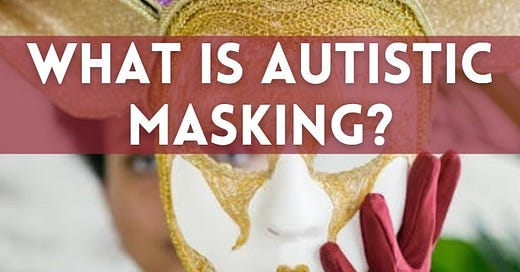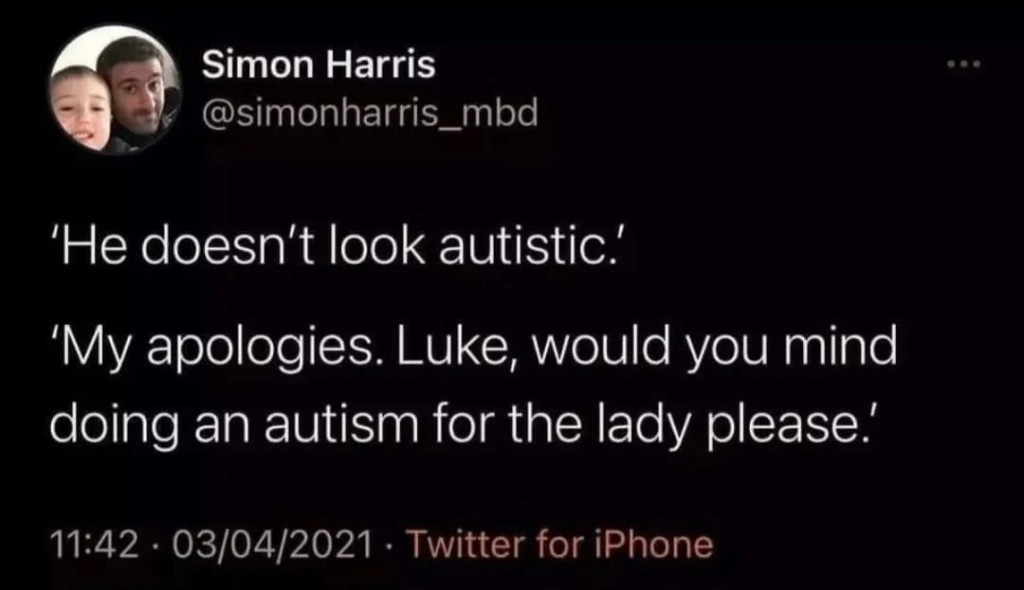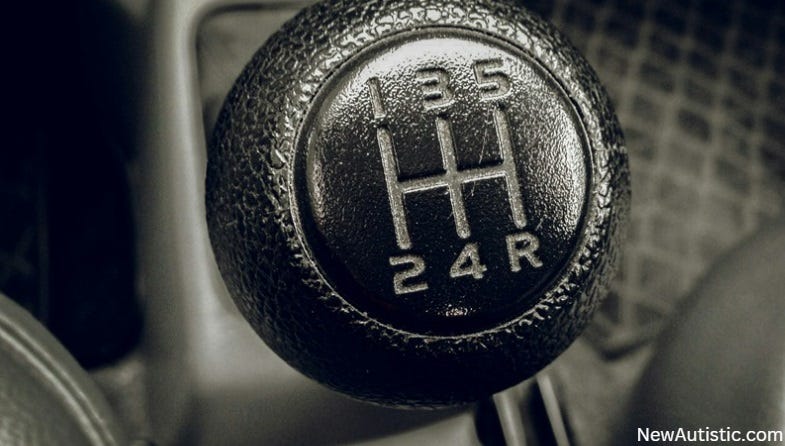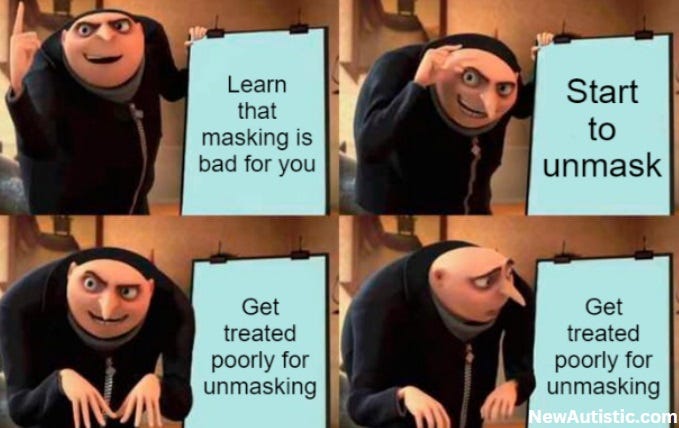What is Autistic Masking?
The Hidden Cost of Fitting In: Why Some Autistic People “Don’t Look Autistic”
You've probably heard of the term masking before, but what does that mean? Does everyone mask, or just autistics? Is masking a good or a bad thing? In this article, I'll address some of the most common questions and topics related to masking and provide studies and resources to back up my claims, as I always do.
What is Autistic Masking?
Masking (as it relates to autism) is a term for the way in which some autistics change and adapt their behavior in order to avoid judgment, rejection, and/or bullying. It's also used to help facilitate social connections, succeed in the workplace, and to fit in with peer groups.
The terms masking and camouflaging are often used interchangeably, although some argue that there is a difference. For the purposes of this article, I'll mostly stick to the term masking.
Most People Mask Sometimes
Most people are capable of masking, and indeed do in certain situations. For example, you probably have a way of speaking at your job that is different than the way you might speak when with your friends. You probably don't use a bunch of curse words and slang while working at your job, but you might use those words and phrases while speaking with friends. Additionally, you might text your close friends differently than you would text your boss or coworkers (which is sometimes referred to as code switching). These are a few examples of masking that most people engage in at some point during their lives. Autistic masking, however, is different -- both in its pervasiveness and impact.
Normal Masking vs. Autistic Masking
Think again about the times that you might've had to mask or interact differently with people depending on the situation. Was that easy to do? Probably not, because studies have shown that it not only takes mental and physical effort to mask, but there is also a negative impact on the person doing the masking.
Now, imagine that you have to mask for every single social interaction that you have: at school, at work, at the grocery store, with colleagues, with friends, and perhaps even with your family. Before you speak to anyone, you have to carefully consider your words, tone, and facial expressions, and figure out which topics will be deemed "appropriate" for the conversation. How quickly would you become exhausted from doing all of this all the time? And you'd better be able to process all that information very quickly because if you stand there saying nothing, people will think you're weird — or worse yet, stupid.
Of course, some autistic people are lucky enough to have people in their lives that they are able to unmask around. For many autistics though, and especially those who are undiagnosed, they may not even be aware that they're masking constantly; all they know is that they feel extremely drained after social situations, or exhausted and fatigued all the time without having an easily identifiable reason. For other autistic people, masking may even become a permanent or semi-permanent fixture in their lives.
Masking is also the reason that some people don't "look autistic," as some like to say. We mask to seem normal or neurotypical, so of course by masking, we aren't going to seem as autistic as we actually are.
Automatic vs. Manual Transmission
Another metaphor I've seen for the masking phenomenon is comparing it to an automatic versus a manual transmission (stick shift) when it comes to driving a car.
An automatic (neurotypical) transmission does the work for you. All you have to do is put the car in drive, and off you go! You don't have to touch the shift again until you're ready to put the car in park.
For autistics, our social engagement is more like a manual transmission. We have to constantly change gears depending on speed and the road conditions, which means we're constantly monitoring everything going on around us. That doesn't mean we can't drive or are bad drivers — rather, that it requires more effort, focus, and attention to make sure the drive is safe and smooth.
So, whereas someone driving an automatic car only has to touch the gear shifter once or twice to go to the grocery store (to put the car in drive and then in park again), an autistic person might have to keep their hand constantly on the stick shift, changing gears several times per minute for the exact same route to the exact same store.
Unfortunately, autistic people are then often told by many people who only drive automatics (and who have never even driven a stick shift) that driving is "so simple," doesn't require "that much focus," and we autistic people must be "overreacting" or "sensitive" if we think that driving is draining. There is no acknowledgement of how much more difficult it can be to drive a manual transmission, and we receive only harsh judgments that we aren't "trying hard enough" and that we're "complaining about nothing."
Masking Causes Fatigue and Exhaustion
You might be able to mask constantly for a little while, but doing it all the time is what leads a lot of autistic people to burnout — a topic I'll cover in a later article. This is part of the reason that a lot of autistic people get so drained from seemingly simple social situations.
Masking requires a ton of physical and emotional effort, and it's not just in our heads, either. Many studies have been conducted on autistic masking and camouflaging, often revealing a plethora of negative short- and long-term effects on both autistic non-autistic people:
"In the short term, camouflaging results in extreme exhaustion and anxiety; although the aims of camouflaging are often achieved, in the long-term there are also severe negative consequences affecting individuals’ mental health, self-perception, and access to support" (Hull et al., 2017).
"Thematic analysis revealed that some aspects of masking are shared across autistic and nonautistic people, such as utilizing mimicry of others as a social strategy or feeling exhausted from masking. All groups reported that masking made them feel disconnected from their true sense of identity and had a negative effect on them. Other aspects of masking seemed more specific to autistic people, such as sensory suppression, and masking leading to suicidal ideation" (Miller et al., 2021).
"Experts by experiences defined autistic burnout as: a severely debilitating condition with onset preceded by fatigue from camouflaging or masking autistic traits, interpersonal interactions, an overload of cognitive input, a sensory environment unaccommodating to autistic sensitivities and/or other additional stressors or change" (Arnold et al., 2023).
"Can't You Just Stop Masking?"
This is a common question I hear from people once they understand masking and the negative impact it has on neurotypical and neurodivergent people alike. "Can't you just stop doing it, then?" Therein lies one of the biggest issues with masking, at least from this author's perspective.
Yes, we know that masking is harmful. However, when we don't mask, we're often treated very poorly. Below are some responses that I've personally received when I've stopped masking, either because I was too exhausted to continue or because I was encouraged to start to try to unmask:
"Are you upset? You seem upset."
"Why do you look angry?"
"Are you mad at me?"
"You must be tired."
"Why aren't you talking?"
"Are you unhappy?"
"You need to fix your face."
"Do you not like me?"
I'm sure I'm not alone in my experiences, or in the questions and comments that I often get bombarded with whenever I even attempt to unmask. So, on one hand, we're encouraged to unmask. On the other, we get treated poorly when we do attempt to unmask.
For me and many others like me, we choose to maintain the mask because it makes it easier to be accepted in society, although it comes at the cost of our own well-being. Other autistic people choose not to mask (or don't have the capacity to) and are subsequently ostracized for being "strange" or "weird" by most people. It's a double-edged sword, to be sure.
How Can You Help?
If someone close to you is trying to unmask, the best way to help them is to ask them what you can do. Every autistic person is different and may prefer a different method for understanding them better.
If you want some more concrete examples, I can only speak for myself, but I typically ask that my friends and loved ones don't read too much into my facial expression — or more typically the lack thereof. I ask that they don't doubt my sincerity even if my tone or chosen words aren't what a "normal" person might use. I ask them not to make thin-slice judgments about how I might be feeling about an issue and to instead ask me directly instead of making assumptions.
Communicating openly and honestly is a preferred means of communication for a lot of autistic people, so if you aren't sure, just ask. Most of us are more than happy to offer potential solutions and work together toward mutual understanding.
Thanks for Reading!
Thanks for taking time out of your busy day to spend some time with me! I encourage all of my readers to RISE (Reflect, Improve, Strengthen, & Evolve) with me because healing is a lifelong journey — it’s not always easy, but it’s always worth it. You are loved, cherished, and valued. Don’t ever let anyone ever convince you otherwise.
My commitment to bringing you FREE, well-researched, and comprehensive content means I spend considerable time and effort writing each article or post without compensation.
Want to Support Me?
The simplest FREE way you can support me is by subscribing, sharing, or leaving a comment:
I believe in keeping my content accessible to everyone, without paywalls, because I know the work I do matters. For that reason, I’m beyond grateful for any financial support! If you'd like to support me and my work, check out my art website at AriesArtwork.com to bring home something unique or find a gift for that special someone in your life:
I’ll see you again when I’ve got a new info-dump for you, my Newtistics Crew!
—Skylar Aries









